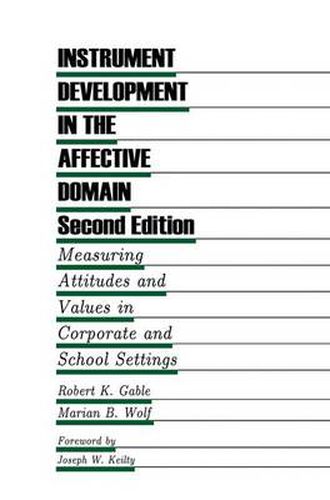Readings Newsletter
Become a Readings Member to make your shopping experience even easier.
Sign in or sign up for free!
You’re not far away from qualifying for FREE standard shipping within Australia
You’ve qualified for FREE standard shipping within Australia
The cart is loading…






This title is printed to order. This book may have been self-published. If so, we cannot guarantee the quality of the content. In the main most books will have gone through the editing process however some may not. We therefore suggest that you be aware of this before ordering this book. If in doubt check either the author or publisher’s details as we are unable to accept any returns unless they are faulty. Please contact us if you have any questions.
There has been longstanding interest in affective characteristics in both educational and corporate environments. While each domain has produced its own set of theorists and researchers, the work of some, such as Bandura, has found a place in the literature of both areas. In each of these settings, theorists and researchers have agreed on the causal connections between such constructs as self-efficacy and perceived satisfaction and success, whether that success is measured by academic achievement or corporate quality and performance resulting in profitability. Along with this interest, comes the need for the development of valid and reliable instruments to assess affective characteristics. It is clear that no matter whether your interest lies in the relationship between self-efficacy and academic success or employee satisfaction and corporate success, it is essential that the instruments used be carefully designed and tested to assure that they are measuring what they are intended to measure in a consistent manner. This work offers the theoretical perspective, modern psychometric techniques, real examples, and data needed to enable the instrument developer to produce such valid and reliable instruments.
$9.00 standard shipping within Australia
FREE standard shipping within Australia for orders over $100.00
Express & International shipping calculated at checkout
This title is printed to order. This book may have been self-published. If so, we cannot guarantee the quality of the content. In the main most books will have gone through the editing process however some may not. We therefore suggest that you be aware of this before ordering this book. If in doubt check either the author or publisher’s details as we are unable to accept any returns unless they are faulty. Please contact us if you have any questions.
There has been longstanding interest in affective characteristics in both educational and corporate environments. While each domain has produced its own set of theorists and researchers, the work of some, such as Bandura, has found a place in the literature of both areas. In each of these settings, theorists and researchers have agreed on the causal connections between such constructs as self-efficacy and perceived satisfaction and success, whether that success is measured by academic achievement or corporate quality and performance resulting in profitability. Along with this interest, comes the need for the development of valid and reliable instruments to assess affective characteristics. It is clear that no matter whether your interest lies in the relationship between self-efficacy and academic success or employee satisfaction and corporate success, it is essential that the instruments used be carefully designed and tested to assure that they are measuring what they are intended to measure in a consistent manner. This work offers the theoretical perspective, modern psychometric techniques, real examples, and data needed to enable the instrument developer to produce such valid and reliable instruments.